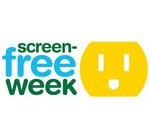 We at Unplug and Reconnect are proud to endorse “Screen-Free Week,” a weeklong unplugging event sponsored by the Campaign for a Commercial-Free Childhood (CCFC) during the week of April 30 to May 6, 2012.
We at Unplug and Reconnect are proud to endorse “Screen-Free Week,” a weeklong unplugging event sponsored by the Campaign for a Commercial-Free Childhood (CCFC) during the week of April 30 to May 6, 2012.
According to the CCFC, “Screen-Free Week is an annual celebration where children, families, schools and communities turn off screens and turn on life. Instead of relying on screens for entertainment, participants read, daydream, explore, enjoy nature and enjoy spending time with family and friends.”
The statistics tell the story of why an event like “Screen-Free Week” is necessary. Children as young as preschool-age spend an average of 32 hours a week viewing a television or computer screen for entertainment – and older children even more time than that, according to the CCFC. This screen time has been linked to poor school performance, childhood obesity and attention problems, and also exposes children to harmful marketing.
“Regardless of whether they are consuming ‘good’ or ‘bad’ programming, it’s clear that screen media dominates the lives of far too many children, displacing all sorts of other activities that are integral to childhood,” the CCFC points out.
We hope our readers will consider joining the thousands of parents, teachers, healthcare professionals, and religious and civic leaders who are supporting “Screen-Free Week” with a wide range of unplugged activities. For more information about this valuable initiative, check out the campaign’s website.



